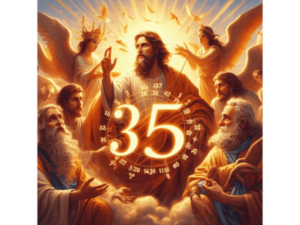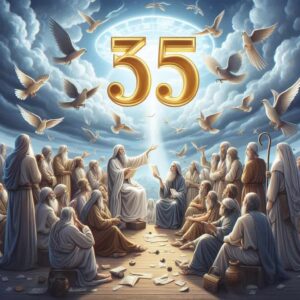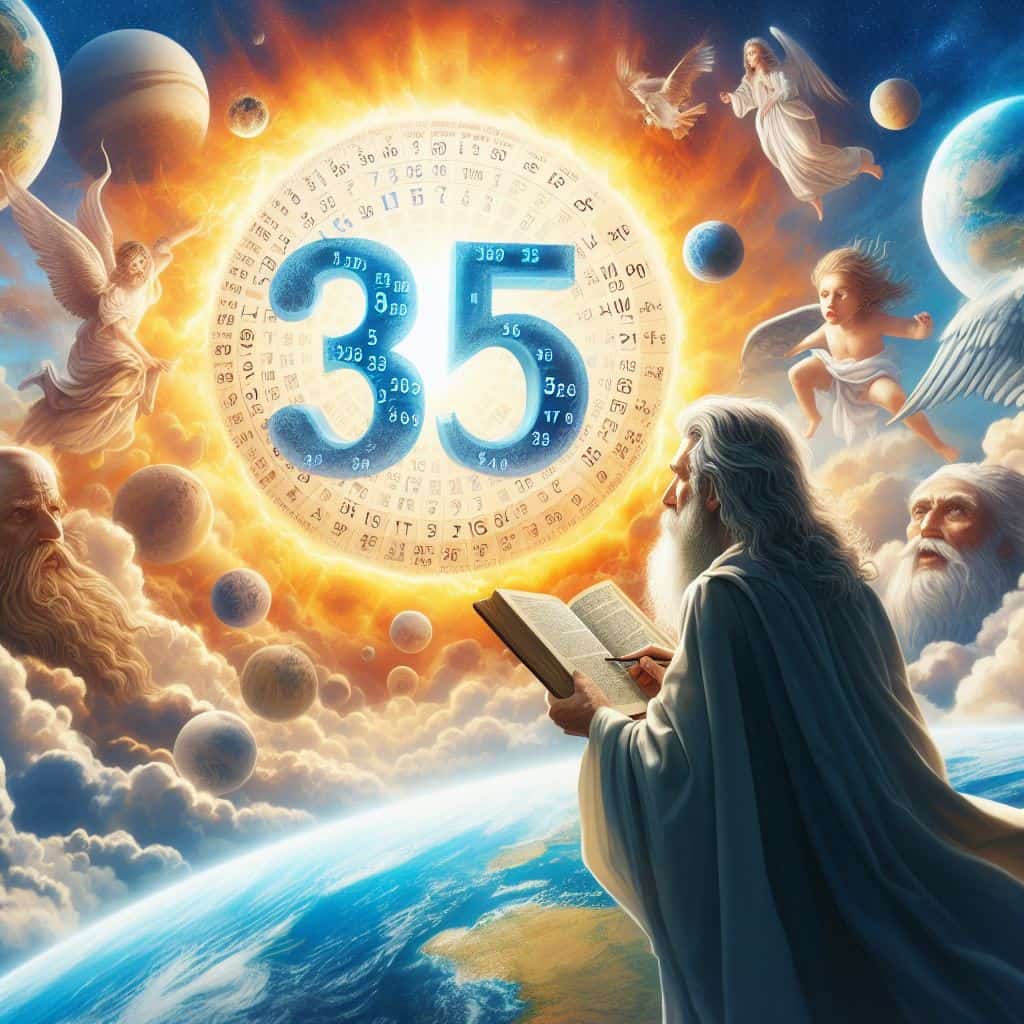The number 35 holds deep symbolic significance in the Bible, representing key spiritual concepts like divine grace, hope, redemption, and the fulfillment of God’s promises.
While not frequently directly referenced, the occasions when 35 does appear often denote monumental, fate-altering events and transitions for key biblical figures.
Through understanding the layered spiritual meanings behind this number, we can apply the wisdom and hope it represents to align our own lives more fully with God’s perfect plan.
Key Takeaways
- Symbolizes grace, hope, faith, and fulfillment of God’s promises. It represents major transitional moments and new beginnings.
- The numeric product of 5 (grace) and 7 (divine completion) – points to achieving wholeness through God’s grace.
- Associated with redemption – 35 shekels to redeem firstborn son in Old Testament, Christ’s sacrifice that redeems humanity in New Testament.
- Represents the perseverance of faith and hope, as seen in Abraham and Sarah’s 35 year wait for the fulfillment of God’s promise.
- Can signify difficult but necessary seasons of change and spiritual maturation, as reflected in the life transitions of biblical figures.
- Understanding 35 provides wisdom and encouragement to trust in God’s plan, embrace His grace, and align our lives with divine purposes.
Biblical References to the Number 35
The number 35 appears several times in the Bible and is often associated with significant events and people.
One notable example is the age of Joseph when he stood before Pharaoh to interpret his dreams, ultimately leading to his appointment as governor of Egypt (Genesis 41:46).
Another reference is the number of years that David reigned as king, representing his complete and perfect reign over Israel (2 Samuel 5:4).
Additionally, the book of Numbers mentions 35 as the number of bulls that were sacrificed during the Feast of Tabernacles, symbolizing the abundance and generosity of God’s blessings (Numbers 29:32-34). This same feast lasted for seven days, which could represent the completion of a divine cycle (Leviticus 23:34).
Furthermore, the Gospel of Luke lists 35 generations from Abraham to Jesus in his genealogy, emphasizing the fulfillment of God’s promise to send a Messiah to save humanity (Luke 3:23-38).
Symbolic Meaning of 35 in the Bible

In the Bible, the number 35 symbolizes hope, trust, and faith in God’s promises. It is often associated with the concept of new beginnings and the fulfillment of God’s plan.
The number 35 is an important factor in the divine numerology of the Bible. It is the product of 5 and 7, which are both significant numbers in biblical numerology.
The number 5 represents God’s grace, while the number 7 is a symbol of perfection and completeness. Therefore, the number 35 is a powerful representation of God’s grace and His perfect plan for our lives.
The number 35 is also related to the concept of redemption in the Bible. In the Old Testament, the number 35 is mentioned in the context of the redemption of a firstborn son.
According to the Mosaic Law, a firstborn son could be redeemed by paying 5 shekels of silver to the priest, plus an additional 30 shekels of silver. This total of 35 shekels represented the cost of the redemption.
In the New Testament, the number 35 is not specifically mentioned, but the concept of redemption is central to the Christian faith. Through His sacrifice on the cross, Jesus Christ paid the price for our redemption and made it possible for us to be reconciled to God. The number 35 can therefore be seen as a reminder of the cost of our redemption and the incredible love and grace that God has shown us.
In summary, the symbolic meaning of 35 in the Bible is deep and multi-faceted. It represents hope, trust, and faith in God’s promises, as well as new beginnings and the fulfillment of His plan.
It is also a powerful symbol of God’s grace, the cost of our redemption, and the incredible love that He has shown us through Jesus Christ.
The Hidden Significance of 35

As we have explored in previous sections, the number 35 carries deep biblical meaning and significance. But what is the hidden significance of 35?
One of the significant factors of 35 is that it is the product of 5 and 7, two numbers that are important in biblical numerology. It represents the combination of grace (5) and completeness (7). This combination suggests that through God’s grace, we can achieve completeness and wholeness in our lives.
Another meaning of 35 is related to the concept of hope. In the Bible, Abraham and Sarah gave birth to their son Isaac when they were 100 and 90 years old, respectively. This event is significant because God had promised them a child, and they had waited for 35 years before the promise was fulfilled. The number 35, therefore, represents the hope and faith required to wait for God’s promises to come to fruition in our lives.
Furthermore, 35 is associated with the idea of transition and change. In the Bible, David reigned as king of Israel for 40 years, and his son Solomon succeeded him as king. However, it took 35 years for the transition of power to occur. This event reflects the idea that significant changes and transitions in our lives may take time and patience, but they will happen according to God’s plan.
Overall, the hidden significance of 35 encourages us to trust in God’s grace, have faith and hope in His promises, and be patient during times of transition and change. By embracing these principles, we can live in alignment with our faith and find spiritual fulfillment in our lives.
Possible Occurrences of 35 in Jesus’ Life
When exploring layers of meaning in scripture, some speculative connections emerge from numerology related to Christ’s earthly ministry.
Various scholars suggest there may have been 35 specific miracles of Jesus recorded in the Gospels. However, there is no firm consensus on the exact number, with estimates ranging from 35 to 39. More important than quantity is what Christ’s miraculous signs communicate about his divine authority and the inauguration of the kingdom through his incarnation.
Additionally, some numerological theories speculate there were approximately 35 parables told by Jesus. But again, estimates of his parables vary, and classification methods differ. Rather than hinging meaning on this specific total, the content and purpose of Jesus’ parables carry deeper revelatory influence as he brings heavenly mysteries to earth.
Likewise, conjectures have arisen over the notion of 35 titles for Christ in Scripture. But the possibility of this precise number bears secondary importance to theological richness conveyed in the names of the Son of Man and Son of God we do find revealed in the biblical text.
In short, while interesting theories abound regarding quantities of 35 related to aspects of Jesus’s life and works, what emerges as most foundationally important are the qualitative truths and salvific purpose contained in Christ’s signs, illustrations, and appellations testifying to his messianic identity as fulfilled in Scripture. Any numerical symbolism beyond direct textual support remains speculative.
Number 35 in History and Culture

Beyond Scripture, insights into the symbolic meaning of 35 emerge when we explore ancient Jewish and Near Eastern culture contemporary to the biblical era.
In ancient Persia, significant sections of the Zoroastrian holy scriptures, the Avestas, were composed of 35 chapters. This religious tradition influenced Judaism after the Persian exile. Potentially the 35-chapter structure carries significance tied to cosmological numerology later reflected in the Bible.
Additionally, in Jewish mystical tradition, 35 represented the number of lashes or curses afflicted upon enemies. This links to the 35 curses outlined in Deuteronomy 28 for those who disobeyed God. The number took on almost talismanic properties around warding off evil.
In the Jewish Mishnah, a core legal text studied alongside the Torah, 35 signifies the age of full understanding in a person. Modern rabbis connect this to the miracle of the Afikomen matzo bread during Passover. Pieces are hidden for children to find, rewarded with gifts for discovering wisdom. When a person reaches 35 years, they now “find” wisdom for themselves rather than relying on others.
Finally, early Christian thinkers like St Augustine wrote of 35 signifying the spiritual path of tribulation that leads to perfection. The number becomes symbolic of difficult but necessary growth. Just as transition to wisdom comes through struggle, Augustine saw in 35 the hardship that births saints. Suffering produces perseverance, character, and hope according to Romans 5:3-5, transforming the soul into the image of God.
Therefore in numerous ways, views on 35 in the ancient world interconnect with and illuminate theological symbols we uncover in biblical numerology.
Living in Alignment with Faith
Understanding the symbolic and spiritual meaning of 35 can have a profound impact on our lives. It encourages us to seek wisdom, embrace divine guidance, and live in alignment with our faith.
We can draw strength from the wisdom and guidance provided by the number 35, and apply it in our daily lives. Whether we are facing challenges or simply seeking guidance, the significance of 35 in biblical numerology can provide us with comfort, hope, and inspiration.
By seeking a deeper understanding of the Bible and its numerology, we can discover hidden truths and insights that can enrich our lives and deepen our spiritual connections. May we all be guided by the power and wisdom of the number 35, and live our lives in alignment with our faith and purpose.
FAQs
Q: What is the biblical meaning of 35?
A: The number 35 holds significant biblical meaning and symbolism. It represents the combination of the numbers 3 and 5, which both have their own spiritual significance in the Bible.
Q: What is the symbolic meaning of 35 in the Bible?
A: The symbolic meaning of 35 in the Bible is closely related to the concepts of grace, hope, and faith. It is seen as a number that represents the divine favor and blessings bestowed upon individuals who walk in alignment with their faith.
Q: Are there any biblical references to the number 35?
A: Yes, there are several biblical references to the number 35. These references can be found in various passages and stories, each carrying its own unique message and lesson.
Q: How does numerology play a role in the interpretation of the number 35?
A: Numerology plays a significant role in understanding the interpretation of the number 35 in the Bible. It helps us uncover the deeper spiritual truths and insights hidden within numbers, allowing us to gain a deeper understanding of their significance in biblical contexts.
A: The hidden significance of the number 35 can provide us with valuable spiritual insights that we can apply to our lives. It encourages us to seek wisdom, embrace divine guidance, and live in alignment with our faith.
Q: How does the number 35 relate to my spirituality and personal growth?
A: The number 35 relates to your spirituality and personal growth by reminding you to embrace grace, have hope, and live with faith in your heart. It serves as a reminder to seek spiritual wisdom and live in alignment with your beliefs.






